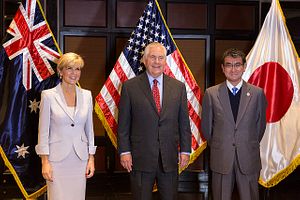While China was celebrating its diplomatic success at the Manila Association of Southeast Asian Nations (ASEAN) Foreign Ministers’ Summit this year, the United States, Australia, and Japan decided to spoil the moment by publicly challenging China on the South China Sea issue.
On August 7 — during the 50th ASEAN ministerial meeting — U.S. Secretary of State Rex Tillerson and his counterparts Julie Bishop and Taro Kono met in Manila for the seventh ministerial meeting of the Trilateral Strategic Dialogue (TSD) and jointly issued a statement that included a paragraph demanding that China and the Philippines abide by the 2016 arbitral ruling on the South China Sea.
The South China Sea issue was the most sensitive topic for China during the ASEAN Summit; one of China’s goals at the Summit was to downplay the topic. If it was not for the U.S.-Australia-Japan, joint statement, the goal was nearly achieved. On August 8, China’s foreign ministry published Chinese foreign minister Wang Yi’s remarks on the ASEAN final communique:
Every year, the joint communique would publish contents related to the South China Sea, but this year a change has been made: first, the length of related contents is significantly shorter than in the past; Second, the ASEAN countries have… approved the South China Sea Code of Conduct (COC) framework with China and showed a positive attitude toward the next step’s specific consultation.
However, against China’s will, the U.S.- Australia-Japan joint statement used a lengthy paragraph to highlight the South China Sea topic:
The ministers expressed serious concerns over maritime disputes in the South China Sea (SCS). The ministers voiced their strong opposition to coercive unilateral actions that could alter the status quo and increase tensions. In this regard, the ministers urged SCS claimants to refrain from land reclamation, construction of outposts, militarization of disputed features, and undertaking unilateral actions that cause permanent physical change to the marine environment in areas pending delimitation.
In case the audience could not understand which country the statement was referring to and the strong words like “serious concerns,” “strong opposition,” and “coercive unilateral actions” were not enough to express the ministers’ attitude, the statement further addressed China directly:
The ministers called on China and the Philippines to abide by the Arbitral Tribunal’s 2016 Award in the Philippines-China arbitration, as it is final and legally binding on both parties… The ministers urged ASEAN member states and China to fully and effectively implement the 2002 Declaration on the Conduct of Parties in the South China Sea (DOC).
In addition, after the ASEAN meeting, China was particularly satisfied that the ASEAN states had approved the framework for the Code of Conduct for the South China Sea (COC). Yet, even on this “positive” result, the three-country statement had a different opinion:
The ministers acknowledged the announced consensus on a framework for the Code of Conduct for the South China Sea (COC). The ministers further urged ASEAN member states and China to ensure that the COC be finalized in a timely manner, and that it be legally binding, meaningful, effective, and consistent with international law.
Undoubtedly, from the Chinese perspective, the U.S.-Australia-Japan joint statement seriously broke the top hidden rule of foreign diplomacy: never make others lose face publicly. Expect China not to be very friendly toward the United States, Australia or Japan in the near future, as there is an old proverb in China: “If you don’t save my face, I won’t save yours.”

































